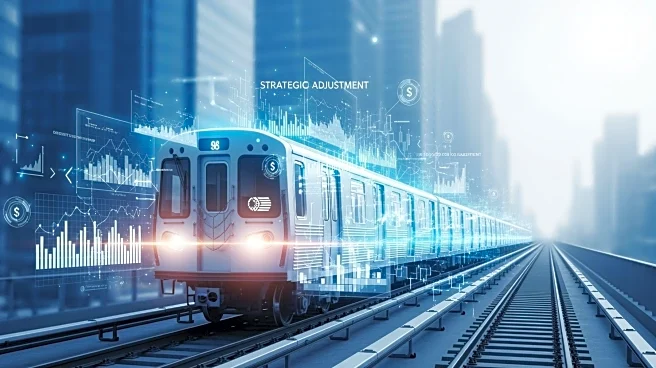What's Happening?
The Regional Transportation Authority (RTA), along with Metra, Pace, and the Chicago Transit Authority, has announced a significant reduction in its projected financial deficit for 2026. Initially, the agencies warned of a fiscal cliff exceeding $771
million, which threatened extensive layoffs and service cuts of up to 40%. However, recent financial adjustments have reduced the deficit to approximately $200 million. This improvement is attributed to increased sales tax revenue across six counties and a planned fare increase of at least 10%, marking the first hike since 2018. Additionally, a $74 million fund transfer from Metra and Pace to the CTA has contributed to the financial stabilization. Despite these developments, the RTA still faces challenges due to the anticipated loss of federal COVID-19 relief funds, which previously supported public transit networks during the pandemic.
Why It's Important?
The reduction in the projected deficit is crucial for maintaining public transportation services in the Chicago region, which are vital for reducing road congestion and supporting economic activity. The financial adjustments provide temporary relief but highlight the ongoing need for sustainable funding solutions. Without further state aid, the RTA may still face service cuts, impacting commuters and potentially leading to increased traffic congestion. The situation underscores the importance of legislative support and strategic planning to ensure the long-term viability of public transit systems. The anticipated fare increases and tax revenue growth are positive steps, but they may not fully address the funding gap, necessitating continued advocacy for state intervention.
What's Next?
The Illinois legislature is expected to address transit funding during the fall veto session, which ends on October 30. However, any legislative action requires a three-fifths vote due to recent changes, complicating the passage of funding measures. Lawmakers may defer transit issues until next year, leaving the RTA's financial future uncertain. Meanwhile, Metra is testing a café car on select routes to attract more riders, potentially increasing revenue. The RTA's deficit is projected to rise in subsequent years, reaching $789 million in 2027 and $888 million in 2028, if not mitigated by state aid, fare hikes, or tax increases.
Beyond the Headlines
The financial challenges faced by the RTA highlight broader issues in public transit funding and governance. The reliance on federal relief funds during the pandemic exposed vulnerabilities in the system's financial planning. The introduction of café cars by Metra reflects efforts to innovate and enhance rider experience, which could influence future transit strategies. The situation also raises questions about the effectiveness of current governance structures and the need for reform to ensure transparency and accountability in financial planning.

















